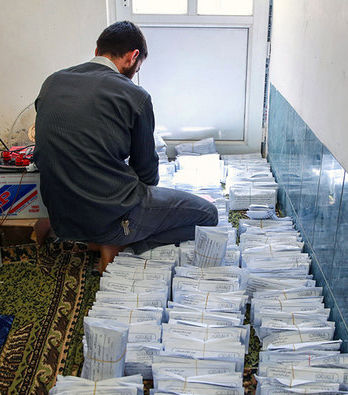
WASHINGTON – When guys like Trump and Carson conflate Islam and ISIS, they do more than foster hate and fear. They help legitimize ISIS’ claim to be an Islamic group. Actually, it’s an organized crime organization using religion as a front.
The largest source of revenue for ISIS is the money it extorts from people living in the territory it controls. Often before they attack an area, ISIS soldiers will promise to do no damage if community leaders surrender and pay huge amounts of money.
The vast majority of ISIS victims are Muslims.
The only difference between ISIS and a traditional organized crime group is that ISIS holds sway over an immense area and has no scruples about killing innocent people.
The U.S. is primarily responsible for creating the conditions that have allowed ISIS to flourish.
The organization now runs a huge swath of territory covering Iraq, Libya and Syria. American “regime change” operations in this area produced chaos. ISIS, or the so-called “Islamic State,” has filled the vacuum, promising people an effective government.
This “government,” according to a recent article in the New York Times, collects tens of millions of dollars a month from its victims, or some $1 billion a year.
ISIS collects tolls from people using roads and issues traffic tickets. It charges rent for government buildings and takes money from families for the use of water and electricity. It also taxes income, crops and cattle and imposes fines for wearing the wrong clothes.
The Islamic State also demands a cut of the revenues earned by small businesses. “We either pay in olive oil or cash, it depends on the production,” a small farmer from near Aleppo in Syria told the Times.
Furthermore, in Mosul, Iraq, ISIS created a market with 60 shops selling fruits and vegetables. The annual rent for a market stall is 2.8 million Iraqi dinars, or roughly $2,500, a huge sum that leaves many of the stall owners penniless.
In the Syrian city of Raqqa, ISIS thugs comb the city’s markets to collect a “cleaning tax” of 2,500 to 5,000 Syrian pounds, or about $7 to $14 per month depending on the size of the shop.
ISIS also directly skims money from a long list of businesses in the area it controls. These include water-bottling and soft drink plants, textile and furniture workshops, mobile phone companies and factories producing tile, cement and chemicals.
ISIS operatives don’t call the payments they extort a “bribe,” a “fee,” or a “tax.” They call it a “zakat,” the tithe many Muslims give in the practice of their faith.
A zakat usually equals 2.5 percent of a person’s wealth. ISIS takes 10 percent.
What happens if a person refuses to pay or misses a payment? Just like any racketeering outfit, ISIS uses violence.
For example, the Times reports, “three times a month, Mohammad al-Kirayfawai hands $300 to fighters from the Islamic State for the privilege of driving his refrigerated truck full of ice cream and other perishables from Jordan to a part of Iraq where the militants are firmly in charge.”
“If I do not [pay],” Kirayfawai told the Times, “they either arrest me or burn my truck.”
After extortion, the second largest source of income for ISIS comes from a combination of oil production, smuggling and looting antiquities.
The same as any criminal organization, ISIS puts profits before principle.
The Islamic State trades with individuals and businesses in the countries it is fighting. For example, it sells oil at cut-rate prices to Kurds in Iraq.
Totaling up all its income, observers say that ISIS is world’s richest group of its kind.
To see the entire New York Times article, click here.
Photo: A photo from an Islamic State website showed a member sorting envelopes of zakat, actually forcefully collected “protection” money. Credit via Associated Press.

MOST POPULAR TODAY

High Court essentially bans demonstrations, freedom of assembly in Deep South

UN warns that Israel is still blocking humanitarian aid to Gaza


Resource wars rage in eastern Congo, but U.S. capitalism only sees investment opportunity

U.S. imperialism’s ‘ironclad’ support for Israel increases fascist danger at home






Comments